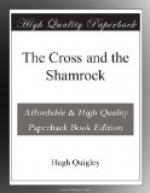There was no great tumult created, however. Election was approaching, and that absorbed all the excitable matter of the people, in spite of the newspapers. The disputes and defences of the faith which Murty O’Dwyer had to maintain since the departure of the young, “beautiful Irish girl,” as Bridget was called, were many and critical; but an event now happened, that fanned the latent but active anti-Catholic fire into a furious flame.
One evening, at supper, after the news arrived at R—— Valley that Paul O’Clery was not only a priest, but stationed in the second city then in the Union, Amanda, casting her malicious eye at her youngest sister Mary, on whose calm cheek she saw, and seemed to envy, the innocent blush that started there, on having heard the paragraph alluding to Paul read and commented on, thus addressed her:—
“Ah, Mary, what do you say, now, to Paul, who is forever estranged from you? for he is not only a priest, but a missionary among the ‘Irish,’ and, of course, can never care about you again.”
“I am glad to hear he is a priest,” said Mary, in a gentle voice; “for I believe he will be more happy so than in any other situation in life. I am sure I wish him happy, for he was ever good and amiable.”
“But yet,” rejoined the old maid, “he never made you any return for all your fondness for him. He never writes you any loving letters, nor cares whether you are living or dead, or else he would write, or send you some tokens of friendship.”
“You know a little too much, Amanda,” said Mary. “I never asked him to write; and I know he loves me so far as to pray for me, and that’s all he ever pretended to; and as for presents, I do not covet them, as I have got this beautiful one, a miniature of the mother of God, set in gold, which Paul presented to me when here last. See it here,” she said, drawing it from her bosom. “I would not give this for all the presents in New York.”
“Idolatry! idolatry!” cried out Amanda. “Idolatry!” cried out Calvin and the rest of the family. “Idolatry! yes, as the Lord liveth,” groaned a hollow, dramatic voice, as he entered by the woodshed way to the dining room. It was that of Rev. Mr. Gulmore, who after a long absence, hearing the Romanizing tendencies that threatened to desolate this once stanch Presbyterian family, came, he said, “with his sickle,” to cut down the cockles, and “weed out this once fertile but now overgrown garden.”




